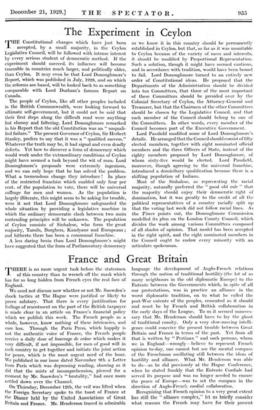The Experiment in Ceylon TrH Constitutional changes which have just
been • accepted, by a small majority, in the Ceylon Legislative Council, will be followed with intense interest by every serious student of democratic method. If the experiment should succeed, its influence will become traceable in countries much larger, and politically older, than Ceylon. It may even be that Lord Donoughmore's Report, which was published in July, 1928, and on which the reforms are based, will be looked back to as something comparable with Lord Durham's famous Report on Canada.
The people of Ceylon, like all other peoples included in the British Commonwealth, were looking forward to ultimate self-government, but it could not be said that their first steps along the difficult road were anything but clumsy and faltering. Lord Donoughmore remarked in his Report that the old Constitution was an " unquali- fied failure." The present Governor of Ceylon, Sir Herbert Stanley, prefers to say that it was a " qualified success." Whatever the truth may be, it had signal and even deadly defects. Yet how to discover a form of democracy which would work under the extraordinary conditions of Ceylon might have seemed a task beyond the wit of man. Lord Donoughmore's proposals were extremely ingenious, and we can only hope that he has solved the problem. What a tremendous change they introduce ! In place of the restricted franchise which enabled only four per cent. of the population to vote, there will be universal suffrage for men and women. As the population is largely illiterate, this might seem to be asking for trouble, were it not that Lord Donoughmore safeguarded the whole situation by providing a legislative machine in which the ordinary democratic clash between two main contending principles will be unknown. The population of Ceylon consists of Sinhalese, who form the great majority, Tamils, Burghers,- Kandyans and Europeans ; and hitherto there has been a communal franchise.
A less daring brain than Lord Donoughmore's might have suggested that the form of Parliamentary democracy as we know it in this country should be permanently established in Ceylon, but that, so far as it was unsuitable to Ceylon because of the variety of races and interests, it should be modified by Proportional Representation. Such a solution, though it might have seemed cautious, and in accordance with tradition, would have been bound to fail. Lord Donoughmore turned to an entirely new order of Constitutional ideas. He proposed that the Departments of the Administration should be divided into ten Committees, that three of the most important of these Committees should be presided over by the Colonial Secretary of Ceylon, the Attorney-General and Treasurer, but that the Chairmen of the other Committees should be chosen by the Legislative Council, and that each member of the Council should belong to one of the Committees. In other words, every member of the Council becomes part of the Executive Government.
Lord Passfield modified some of Lord Donoughmore's details. He arranged that the Council should consist of fifty elected members, together with eight nominated official members and the three Officers of State, instead of the eighty members proposed by Lord Donoughmore, of whom sixty-five would be elected. Lord Passfield, moreover, though agreeing to the universal franchise, introduced a domiciliary qualification because there is a shifting population of Indians.
Most of the Sinhalese, as representing the racial majority, naturally preferred the " good old rule " that the majority should enjoy their democratic right of domination, but it was greatly to the credit of all the political representatives of a country racially split up that the voting last week did not follow racial lines. As the Times points out, the Donoughmore Commission modelled its plan on the London County Council, which divides the work among various Committees composed of all shades of opinion. That model has been accepted in the right spirit, and the eight nominated members in the Council ought to endow every minority with an articulate spokesman.


































 Previous page
Previous page